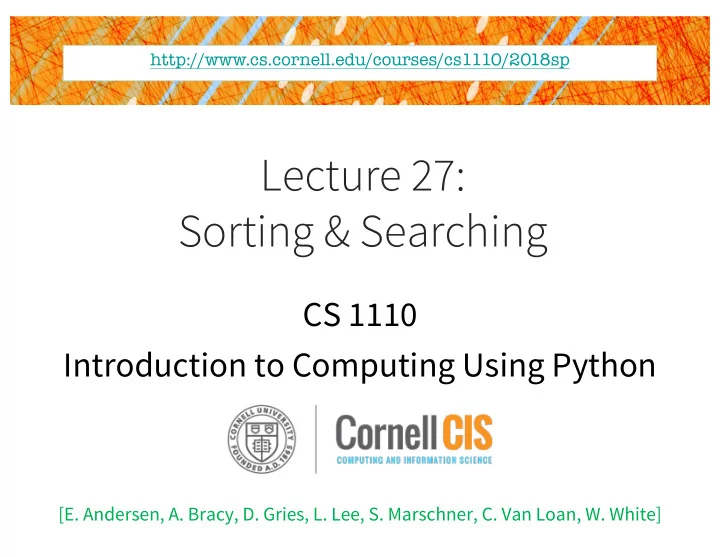

http://www.cs.cornell.edu/courses/cs1110/2018sp Lecture 27: Sorting & Searching CS 1110 Introduction to Computing Using Python [E. Andersen, A. Bracy, D. Gries, L. Lee, S. Marschner, C. Van Loan, W. White]
Announcements • Academic Integrity: § Remember to cite your sources • Assignment 5 § Due 11:59pm on ***Wednesday*** May 9 th § Please see webpage for updates/clarifications • Last Lab due this week in your Lab Section. • Final Exam § May 17 th , 9am-11:30am § Location : Barton Hall Central and East § Conflict assignment on CMS 2
Final Exam Review Session • Hollister B14 from 12-3:30 Saturday May 12: • - Lists/Sequences (12-1) • - Loop invariants/sequence algorithms (1-2) • - Problem solving session (2-3:30) Sunday May 13: • - Call frames (12-1) • - Classes (1-2) • - Problem solving session (2-3:30) 3
Last Week’s Plan of Attack • Insertion Sort • Partition Where we left off • Quick Sort 4
Sorting with Partitions 0 n b ? x • Idea: Pick a pivot element x • Partition sequence into <= x and >= x 0 n b <= x x >= x Now Partition this and this, too Keep recursing… 0 n Sorted! b 5
QuickSort def quick_sort ( b, h, k ): """Sort the array fragment b[h..k]""" if k<=h: h k return pre: b x ? i = partition(b, h, k) h i i+1 k post: b # INV: b[h..i–1] <= b[i] <= b[i+1..k] <= x x >= x # Sort b[h..i–1] and b[i+1..k] quick_sort (b, h, i–1) quick_sort (b, i+1, k) 6 https://www.youtube.com/watch?v=m1PS8IR6Td0
Quicksort in the real world 7 https://xkcd.com/1185/
Today’s Plan of Attack • Quick Sort • Linear Search • Binary Search 8
Linear Search • Vague : Find first occurrence of v in b[h..k-1]. • Better : Store an integer in i to make this post-condition true: 1. v is not in b[h.. i- 1] post: 2. i = k OR v = b[ i ] 9
Linear Search • Vague : Find first occurrence of v in b[h..k-1]. • Better : Store an integer in i to make this post-condition true: 1. v is not in b[h.. i- 1] post: 2. i = k OR v = b[ i ] h k pre: b ? i h k inv: b v not here ? h k=i i h k POST: b v not here v ? OR b v not here 10
Linear Search h k def linear_search(b,v,h,k): ? b """Returns: first occurrence of v in b[h..k-1]""" # Store in i index of the first v in b[h..k-1] i = h Analyzing the Loop # invariant: v is not in b[0..i-1] 1. Does the initialization make inv true? while i < k and b[i] != v: i = i + 1 2. Is post true when inv is true and condition is false? # post: v is not in b[h..i-1] 3. Does the repetend make # i >= k or b[i] == v progress? return i if i < k else -1 4. Does the repetend keep the invariant inv true? 11
Binary Search: What’s the Invariant? • Look for v in sorted sequence segment b[h..k]. § Precondition: b[h..k-1] is sorted (in ascending order). § Postcondition: b[h..i-1] < v and v <= b[i..k] h k pre: b ? Called binary search because each iteration h i j k of the loop cuts the inv: b >= v < v ? array segment still to be processed in half h i k post: b < v >= v 12
Binary Search h k 0 1 2 3 4 5 6 7 8 9 Example b 3 3 3 3 3 4 4 6 7 7 § if v is 3, set i to 0 § if v is 4, set i to 5 § if v is 5, set i to 7 § if v is 8, set i to 10 13
Binary Search h k pre: b ? i = h; j = k+1; h i j k inv: b >= v < v ? while i != j: Looking at b[i] gives linear search from left. Looking at b[j-1] gives linear search from right. Looking at middle: b[(i+j)/2] gives binary search. h i k post: b < v >= v 14
Binary Search h k pre: b ? i j def bsearch(b, v): i = 0 j = len(b) h i j k inv: b < v >= v ? while i < j: mid mid = (i+j)/2 if b[mid] < v: i = mid+1 else: #b[mid] >= v j = mid if i< len(b) and b[i] == v: return i else: return -1 h i k 15 post: b < v >= v
Analyzing Binary Search def bsearch(b, v): i = 0 j = len(b) # invariant; b[0..i-1] < v, b[i..j-1] unknown, b[j..] >= v while i < j: Analyzing the Loop mid = (i+j)/2 1. Does the initialization if b[mid] < v: make inv true? i = mid+1 else: #b[mid] >= v 2. Is post true when inv is true and condition is false? j = mid 3. Does the repetend make if i< len(b) and b[i] == v: progress? return i 4. Does the repetend keep the else: invariant inv true? return -1 16
Binary Search Recursive def rbsearch(b, v): def rbsearch_helper(b, v, i, j): if i >= j: """ len(b) > 0 """ if i < len(b) and b[i] == v: return rbsearch_helper(b, v, 0, len(b)) return i else: return -1 mid = (i + j) / 2 if b[mid] < v: return rbsearch_helper(b, v, mid + 1, j) else: # b[mid] >= v return rbsearch_helper(b, v, i, mid) 17
Recommend
More recommend